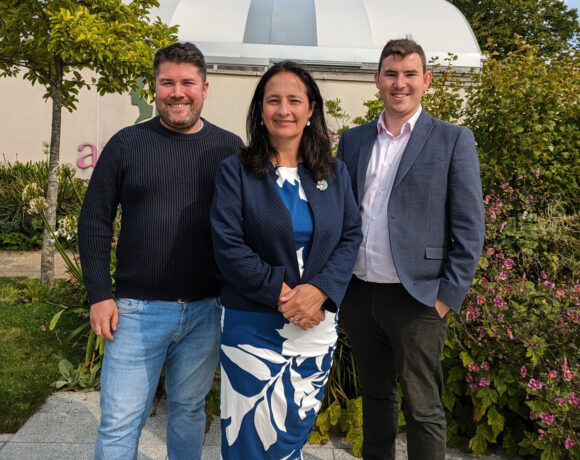A major new decade-long and pioneering strategy for Ireland’s food and drinks sector has received Government approval. ‘Food Vision 2030 – A World Leader in Sustainable Food Systems’ has been launched.
The ambitious and innovative roadmap for the agri-food sector aims to agri-food exports from €14bn to €21bn by 2030 – further enhancing Ireland’s position as global leader in safe, sustainable agri-food exports.
The vision of “Food Vision 2030” is that Ireland will become a world leader in sustainable food systems over the next decade delivering benefits for the sector, for Irish society and the environment. “Food Vision 2030” has been developed by a cross-sectoral committee of agri-food stakeholders and envisages a pathway to a position of world leadership based on progressing the three pillars of sustainability: economic, environmental and social. It sets out four high-level missions to fulfil this ambition:
• A climate-smart, environmentally sustainable agri-food sector.
• Viable and resilient primary producers, with enhanced wellbeing
• Food that is safe, nutritious and appealing, trusted and valued at home and abroad
• An innovative, competitive and resilient sector, driven by technology and talent.
These missions are underpinned by a series of specific goals and actions. Minister for Agriculture, Food and the Marine Charlie McConalogue TD will oversee the monitoring and implementation process for Food Vision 2030 with farm and fisher incomes central to the Minister’s ambition for the strategy.
Speaking at the launch of the policy, An Taoiseach Micheál Martin said, “I am delighted that the agri-food stakeholder committee has agreed this ambitious “Food Vision 2030” Strategy. Agriculture, food and the marine is our largest indigenous sector. It is engrained in the fabric of Irish society and is one of the main drivers of our economy, especially in rural and coastal areas.”
“The vision of being a world leader in Sustainable Food Systems acknowledges the challenges the sector faces, not least environmentally, but crucially it also charts a pathway for the future. We accept the challenge put to Government, to work with the sector in ensuring its future sustainability, economic, environmental and social, and in realising the inherent opportunities that presents”.
An Tánaiste, Leo Varadkar said, “having overseen the start of this Food Vision Strategy as Taoiseach, at the ‘Open Policy Debate’ in October 2019, it’s rewarding to see it come to fruition today. As Minister for Enterprise and Tánaiste, I’m very aware of the economic and social contribution made by Irish food and drink companies, from the artisan producer, to multinationals. I believe the vision of this Strategy is the right one for the future”.
Minister for Agriculture, Food and the Marine, Charlie McConalogue said, “the Committee, led by Tom Arnold, has produced a strategy that is balanced and credible, which identifies a significant opportunity for Ireland in moving to a position of world leadership in sustainable food systems. I welcome the focus on ensuring that farmers fishers and food producers, are competitive and productive, with enhanced well-being and economic sustainability. The incomes of our producers are central and critical to the success of Food Vision 2030 as they are the bedrock of our world-class agri-food sector. The strategy recognises the crucial role the sector has and will continue to play in rural and coastal communities, and in achieving balanced regional development for the country as a whole.
“Ireland is the sustainable food capital of the world and the strategy underlines the important linkages between food and health and nutrition, and the fundamental importance of food safety and quality in achieving a premium position in key markets. I am delighted that the Government endorses and supports for the strategy and I look forward to working with all stakeholders in its implementation.”
Minister for the Environment, Climate and Communications and Minister for Transport, Eamon Ryan said, “this industry-led strategy is an important step forward as it puts, for the first time, environmental measures central to an agri-food sector plan. One crucial element is that it states clearly that the strategy must adjust to meet the Climate Action Plan being launched later this year, as well as other environmental measures which are being rolled out.”
“This will be crucial in future-proofing Ireland’s agricultural and marine sectors. I see this, along with other government strategies, resulting in a new generation of farmers and foresters working the land in a sustainable way, with nature being restored, water quality improving, and premium prices being delivered for high quality sustainable produce.”
Minister of State for Agriculture with responsibility for land use and biodiversity Pippa Hackett said, “as well as committing to become climate neutral by 2050, Food Vision 2030 is also about restoring and enhancing biodiversity; improving water quality; and developing diverse, multi-functional forests. It also contains proposals around reducing food waste, promoting regenerative and organic farming, and much more besides. This framework strategy is exciting in it ambition and I commend the agri-food stakeholder committee for their vision”.
Minister of State with special responsibility for Research and Development, Farm Safety and New Market Development Martin Heydon said, “I welcome Food Vision 2030 and look forward to progressing the missions identified by the agri-food stakeholder committee, especially ’viable and resilient primary producers, with enhanced wellbeing’. While the focus on economic and environmental sustainability is hugely important, this strategy has identified that wellbeing and health & safety must be priorities for all of us.”
“The strategy also shows ambition in relation to developing market opportunities at home and abroad, showcasing our safe, nutritious and appealing food and drink offering. The Strategy identifies innovation in all its forms, as well as a talented and diverse workforce, as key enablers of achieving its vision.”
Tom Arnold, Chair of the Agri-Food Stakeholder Committee concluded, “while the primary purpose of this strategy is to provide a vision and policies for the Irish agri-food sector over the coming decade, it has an important international dimension. Ireland is one of very few countries to have developed an agri-food strategy using a food systems approach. Through its experience of developing its own agri-food strategy and the political commitment to attain the highest standards of sustainability within its domestic policy, Ireland will be in a strong position to play a leadership role in the increasingly substantial debate at international level on sustainable food systems. I have every confidence it will do so.”
[sibwp_form id=2]













